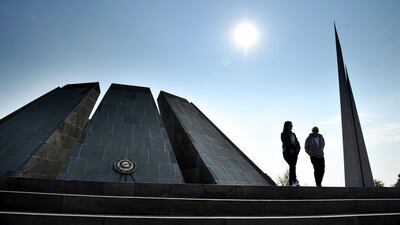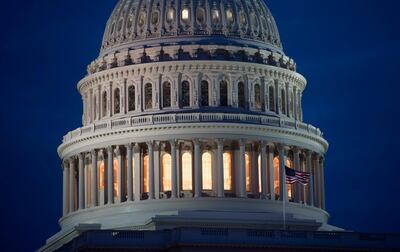The philosopher, novelist and poet George Santayana famously wrote: “Those who cannot remember the past are condemned to repeat it.” This is even more true of those who choose to deny their history.
Last week, the US House of Representatives passed a resolution that recognised the First World War deportations and slaughter of Armenians by the Ottoman authorities as genocide.
During the early 20th century war, the Ottoman empire was fighting for its survival. The Sublime Porte – a synecdoche for the empire's governance – made a disastrous decision under the leadership of the Young Turks to enter the war on the side of the Central Powers, made up of Germany, Austria-Hungary and Bulgaria. Istanbul, or Constantinople as it was then known, feared its Armenian subjects might join forces with its enemy Russia. Some Armenians had already done so. To prevent a potential uprising, millions of Armenian civilians were deported. They were forced to march hundreds of miles into the Anatolian deserts and as many as 1.5 million died, if not from starvation then by marauding bands of Ottoman soldiers.
The 1948 Convention on the Prevention and Punishment of the Crime of Genocide, adopted by the United Nations General Assembly, defines genocide as the “intent to destroy, in whole or in part, a national, ethnical, racial or religious group”. Raphael Lemkin, the principle figure who coined the term, did so while witnessing the Nazi murder of millions of his Jewish co-religionists. However, the lawyer and activist was also profoundly affected by the fate of the Ottoman Armenians.
Much of the controversy revolves around the question of intent; did the Ottoman authorities deliberately seek to destroy the Armenian people? Proving intent is not easy. Textual records only tell half the story.
However, the Ottoman authorities must have known that the mass deportations were tantamount to the destruction of the empire’s Armenian population. How on earth could a specifically singled-out community survive such an ordeal? Moreover, Armenians were Ottoman subjects. The authorities were therefore responsible for their protection, yet it was they who instigated their destruction.
Until now, Congress has resisted recognising the Armenian genocide in order to avoid rupturing ties with its Nato ally Turkey. However, this time not only was the motion was successful but the House also passed sanctions over Ankara's invasion of Syria several weeks ago, which was made possible by president Donald Trump's decision to pull out US troops. Some have argued that Congress is seeking to punish Turkey for its operation against the Kurds.
Turkey's foray into Kurdish-held territory in north-east Syria highlights Santayana's warning about the consequences of ignoring history. Ankara sought to create a so-called safe zone to settle millions of Arab Syrian refugees who are currently resident in Turkey. This would have been tantamount to ethnic cleansing as the majority of the Arab refugees are not from the area while hundreds of thousands of Kurds would be displaced.
Ankara sought to justify its policy by claiming that Kurdish forces had previously expelled Arabs from their homes, that Turkey’s hosting of millions of refugees was unsustainable, and that the Kurdish forces of the YPG, or People's Protection Units, constitute a terrorist threat as they are one and the same as the Kurdistan Workers Party (PKK), an internationally proscribed terrorist group who for decades have waged war against Turkey.
But what was lost on Ankara was that it matters little whether such claims are valid. Displacing Kurds and forcibly creating a safe zone to house millions of Arab refugees, thereby changing the demographic balance of the area, is still ethnic cleansing. The fact that Turkish ministers, including president Recep Tayyip Erdogan, openly propagated such a policy highlights how little has been learned from past mistakes.

In recent decades, Turkey has sought to rediscover its Ottoman heritage. This is a good thing. Ottoman history is profoundly fascinating. Not only was it a vast empire that encompassed parts of Asia, Africa and Europe but the empire’s culture was rich in literature, poetry, music and art. For much of its history, the empire was also a beacon of religious and ethnic tolerance.
But the fate of the Armenians and other minority groups is just as much a part of Ottoman history as the stunning treasures of Topkapi Palace and the magnificent architecture of Mimar Sinan.
Responding to the US genocide resolution, Mr Erdogan said: “A country whose history is full of the stain of genocide and slavery neither has the right to say anything nor to lecture Turkey.”
This is precisely the point. The US is still coming to terms with the crimes of its forefathers, as are countries such as Britain and France, which are publicly discussing and reappraising their colonial legacies. In other countries such as Australia, there is an ongoing debate, known as the history wars, about the nature of the country’s colonialisation process and its damage to aboriginal communities. Such public discussions have not weakened these societies but made them stronger.
An open and public debate about the past is needed in Turkey without scholars having to fear for their careers or livelihoods. Surely, this would make Turkey stronger in the long run and less likely to repeat its historical misdeeds.
Simon Waldman is an associate fellow at the Henry Jackson Society and a visiting research fellow at King's College London


